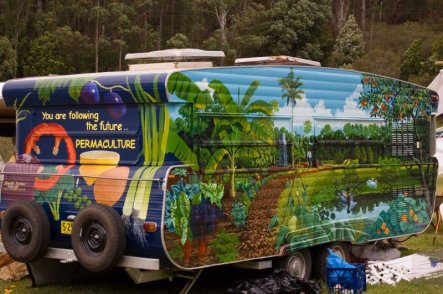What
will your neighbourhood look like in the year 2030? The Transition Initiative
currently spreading across the UK is asking people for their
positive visions of the future. Free from the "dream block," and embracing "dark
optimism," Rob Hopkins, the originator of the Transition concept, views the
Initiative as a vital social experiment. Taking together the problems of Peak
Oil and Climate Change, he argues that communities need to become self-reliant,
and believes – as do many fellow Transitioners – that a powered-down, oil-free
future can be better than the present.
Peak Oil
Theory was first introduced by M. King Hubbard in 1956, when he claimed that
American oil production would go into decline around 1970, and that this
decline would then be followed at a future date by a decline in world oil
production. In The Last Oil Shock: A
Survival Guide to the Imminent Extinction
of Petroleum Man, David Strahan argues that we are now facing "Hubbard's
Peak." The theory states not that oil supplies are about to run out, but that
they have peaked, and that we are at a half-way mark, where the only direction
that remains is down towards dwindling supplies of this finite resource. In his
book The Transition Handbook: From oil dependency
to local resilience, Rob Hopkins
prefers to invert this idea and view the second half of the oil age as a
journey up, out into the air of a new dawn. He prefers not to rely on
alternative energy sources, but instead recommends that we begin to plan for
our future, and look forward to a different way of living.
The
Transition Initiative began in Kinsale, Ireland in 2005, when Hopkins' second
year Permaculture students embarked on an energy descent project. Following a screening
of the Peak Oil film The End of Suburbia (the film examines the concept of Peak Oil and considers the rise and
ultimate downfall of the suburban dream), the student project and community input
resulted in the Kinsale Energy Descent Action Plan covering areas such as food,
education, housing, health, energy, economy, and livelihoods. The KEDAP took the present as its point of
departure, and followed that with a vision of how Kinsale might look in 2021,
if its stated recommendations regarding energy descent were to be implemented.
Permaculture
is one of the main foundations on which the Transition Initiative has been
built. Rob Hopkins acknowledges
influences from David Holmgren, the co-originator of the Permaculture concept.
According to Ben Branwyn of Transition Totnes, Hopkins views Holmgren's 2002 book Permaculture: Principles and Pathways beyond Sustainability as "one of the
best books ever written." If you thought that Permaculture was a system for
growing vegetables, think again.
Permaculture
offers a holistic approach to designing self-reliant communities in the face
of dwindling resources and environmental challenges; Permaculture turns its
face away from passive consumerism. Favouring the local, small scale model over
the global, Permaculture is derived from the careful observation of natural
systems. Local currencies such as LETS schemes, chemical free agriculture, and
site specific solutions to energy, waste disposal, and house building are just
a part of evolving principles in which diversity and difference are viewed as
essential. In Holmgren's view, Permaculture has historically pushed the edge.
Both
Holmgren and Hopkins understand that for the layman, Permaculture can be a
difficult concept to understand. It seems to enter under the radar, presenting
itself as a system of agriculture, but belying its ability to be an integrated
systems design and framework. The Natural Agriculture movement in Japan has covered some similar
territory. In his 1978 book The
One-Straw Revolution, Masanobu Fukouka calls for a gathering of the professions,
artists, philosophers and politicians, to look out over the fields and see
beyond their specialisations, creating a new discourse rooted in the earth.
Followers of Shumei Natural Agriculture have taken this a step further, seeing
it as a practice that engulfs all aspects of living, in order to create a
literal "Heaven on Earth." The relationship engendered from the simple and pure
cultivation of food creates a spiritual understanding and reworked economic
exchanges. These exchanges require sacrifice on behalf of the consumer and the
producer, in an interrelated and interdependent relationship.
In Permaculture: Principles and Pathways,
David Holmgren defines a set of twelve Permaculture Principles, together with
the essential areas requiring change in order to build sustainable communities.
These areas include culture, education, environment, economics, spiritual
health, and land governance. Holmgren welcomes the perception of Permaculture as
a counterculture movement, viewing this perspective as having contributed to a
greater tendency towards experimentation. Holmgren sees an emerging union between
spirituality and materialism as an inevitable part of the drive towards
integrated systems, and recognises that if the spiritual domain is ignored,
destructive forces such as religious fundamentalism will fill the void.
Essential
to any understanding of Permaculture and Transition Culture is top-down
thinking and bottom-up action. Global conditions should be considered, but
actions need to take place at the local level, by individuals or small scale
groups looking for points of intervention where they can be most effective or
useful.
The Transition
Initiative is a local response to Peak Oil and Climate Change. Hopkins insists that if Peak Oil and
Climate Change are not considered together, the top-down thinking becomes suspect. The production of Ethanol provides an apt
example. Increasing population demand in China and India, drought, desertification, and
altered rainfall patterns are currently contributing to grain shortages and
rising food prices, yet there is an increasing amount of agriculture being used
for the production of bio fuel. This raises the question: which is most
important, fuel or food? Hopkins offers the example of New York; in terms of Climate Change it
is less carbon emitting than many other cities, yet in terms of Peak Oil it is
– in his view – ill prepared to cope.
In 2006, when Rob Hopkins left Kinsale for
Totnes in Devon, the UK's first Transition Town was born. In Totnes (a market
town in the south west of England) the Transition model has been
refined, and Totnes now holds Transition training workshops designed to give
communities the skills required to start their own Initiatives and implement
their own Energy Descent Plans. The
Transition concept is spreading rapidly; many other towns, a few cities (hubs)
and even a village have followed suit. My local Initiative is Transition Town
Whitstable, where we are currently at the raising awareness stage of the
Transition process. Other towns and cities across the globe are also "mulling" –
deciding whether to take the Transition route.
Central
to the Transition model is that its message should be positive and that taking
part must be enjoyable. Hopkins believes that doom-laden
environmental messages do not empower people, but leave them feeling helpless
and unable to respond. Shaun Chamberlain,
who is currently producing a Transition Timeline for Totnes, uses the
term "dark optimism" as a way of looking at events with your eyes open, mindful
of the unpalatable truths and ready to stare into the unknown, but facing any
resultant darkness with a belief in the potential of people to overcome
it. Hopkins has also collaborated with Dr.
Chris Johnstone, an addictions specialist, who has used his work on addiction to
examine how communities in industrialised countries can overcome their
dependence on oil. He views inner feelings such as fear and cynicism as the "dream
blocks" that prevent us from creating positive visions.
Creating
positive visions to instigate positive change is essential in the Transition
model. The original vision for Totnes was a twenty-five-year vision taking them
up to 2030. Recognising the cultural significance of storytelling, part of their
visioning work has involved the writing of "fake" newspaper articles from the
future. The articles are intended to aid the process of imagining a future in
which goals are achieved, by presenting tangible images of how a sustainable
town might look.
Hopkins has identified twelve steps in the
Transition process, but he emphasises that these are only guidelines, which can
be used as tools if they are applicable to the needs of any individual
Transition Initiative. The first step
relates to the leadership of the Initiative. A Steering Group is required to
begin the process – my local Steering Group emerged from a pre-existing
environmental action group – but crucially this group is encouraged to
design its own demise from the outset (a process which has already been
successfully achieved in Transition Town Lewes).
As the
concept takes off in a community, subgroups are formed around subjects such as
food and health, and members from these subgroups then form the next Steering
Group. The hope is that leadership will arise out of the issues, and that those
with the appropriate skills will surface when needed. Theoretically, the process
should then be one of continual change and adaptability. When I was first
trying to understand the model, I saw a correlation between online Peer to Peer
networks, but Ben Branwyn told me that, "I don't think of us replicating the
computer model rather than relearning the human one."
The
founders of the Steering Group in my local Initiative have a Permaculture and
arts background. A neighbouring Initiative has been founded by academics from a
local university. Each Initiative is therefore likely to be very different. Members
of the Steering Group have gained a sense of community and support from
attending Transition conferences. They pointed out to me that whilst it can be
easy to gain campaigning support for environmental causes, the task of
transforming an entire way of life is far more daunting. They recognise that
Peak Oil requires people to rethink every aspect of their daily lives and their
society, and that this can prove extremely challenging for many. Getting people
to see how they can respond to this in a positive way is no small task.
The
second Transition step is that of raising awareness. My local Initiative is
currently holding a series of film screenings to potentially include: The Power of Community, A Crude Awakening and The End of Suburbia. It is hoped that
the film screenings will introduce the Peak Oil concept to a wider range of the
community. At the screening of The End of
Suburbia – which was held in the local arts centre – a discussion followed
the film, where the audience was encouraged to talk in groups about the
thoughts and feelings the film provoked. We are also hoping to organise an art trail
to reflect the large local artistic community; and as a means to raise further
awareness and enlist creative energy.
Other
awareness-raising events can also arise from The Great Reskilling. This is the
acknowledgement that we are set to lose many of the practical skills we will
need to become self-reliant. Often these skills rest in the hands of older
community members, and for this reason respecting the elders is seen as
important. Workshops have been held in several Transition Towns and have
included a range of crafts skills and natural building techniques. Education of
this kind, in regaining lost skills and learning practical sustainability, is
potentially essential. The approach recognises how fragmented our communities
have become under global capitalism, and how important integration is.
At
Transition meetings, the use of Open Space Technology is encouraged. At the
first Open Space meeting I attended, it was widely felt that the process had
been very valuable. We were given sheets of A4 to write down questions and
thoughts. These were then laid out on tables and organised according to shared
themes. People formed groups for discussion, but were encouraged to move on if
they felt that would be more productive. Discussion groups noted further
thoughts arising from their conversations. The aim was to identify recurrent
themes and priorities.
After
raising awareness in the community – this is not a fast process and can typically
take a year – Transition Initiatives hold their Great Unleashing. This
comprises an event or series of events to unlock the energy that has built
up behind the Initiative. After the Unleashing it is hoped that the formulation
of groups needed to produce an Energy Descent Action Plan will begin. I
attended an unleashing event in Forest Row (a village in the south east of England). Communal celebrations form an
important aspect of The Transition philosophy.
The Initiative
gaining the most publicity has been the introduction of a local currency in
Totnes, the Totnes Pound. The project is aimed at encouraging local economics
and requires a 5% subsidy on behalf of the consumer; it is still considered to
be at an experimental stage, but trials so far have been successful. In Shumei
Natural Agriculture, farmer Hiroo Kimura developed a community currency called
Leaf Money. Volunteers visited the farm to help and in return were given 500
Leaf Dollars, which they could then spend on the farm's produce. The
translation into ordinary currency was 5 dollars per day of farm labour. Kimura
intended the process to reveal that the price of food does not reflect the care
that goes into growing it. The Leaf Money was based on the values of nature, not
on the values of money. In my view Leaf Money illustrates a more radical
potential for local currencies.
So far
the Transition concept has been successful in small towns, and because it is in
its infancy, it is difficult to say how the urban city will use the tools it
offers. In London, Brixton has begun a hub. They have been collaborating with
hubs in Brighton and Bristol to discuss approaches. One thing
they recognise as being essential is the need to build networks with
agriculture on the outer edges of the cities. In the UK many car park sites were once
thriving market gardens.
David
Holmgren studied the work of Peter Kropotkin when formulating the Permaculture
philosophy. In his Mutual Aid: A
Factor of Evolution, Kropotkin claimed that mutual support in nature and
human societies is more evident than mutual struggle, and believed that
followers of Darwin narrowed his observations for their own
ends, turning his theories into "survival of the fittest." He was critical of
Thomas H. Huxley and of Hobbes' "war of each against all." In Mutual Aid, Kropotkin observed in animal
and human societies evidence to suggest that survival is accomplished through
co-operation not from competition, observing that natural selection actually
finds ways to avoid competition.
In the
1960's, Kropotkin's work was republished and was influential in some experiments at
communal living. In Proposed Communist
Settlement: A New Colony for Tyneside or Wearside, rather than advocate the
small, exclusive communal settlement, Kropotkin suggests that communist
settlements should be "in the neighbourhood of large cities. In such cases
every member of the community can enjoy the many benefits of civilisation; the
struggle for life is easier, on account of the facilities for taking advantage
of the work done by our forefathers and for profiting by the experience of our
neighbours." We have to acknowledge that half of the world population now lives
in cities, and solutions need to include a focus on how cities can thrive.
It is
early days for the Transition Initiative, and it remains to be seen whether
this slow and careful approach will succeed in making the strong, tangible changes
that are required. Rob Hopkins acknowledges that the model will go where it
wants to, and emphasises that he does now know all of the answers or have a
master plan. My local founders likewise are hopeful that the Initiative will blossom,
but cannot be certain as to the direction it will move in.
It is
likely that the Transition Initiative will be joined by other Initiatives, and
that these will drive the movement towards empowerment and self-reliance
forward. The Transition Network is clearly evolving thoughtful and useful
skills, and pioneering techniques essential for the future survival of
communities. In response to the many challenges now facing us, a multitude of Initiatives
may begin to flourish. It is certainly time for us all to fashion the future
from our visions of sustainable co-operation.
Photo by gemmasphotos, courtesy of Creative Commons license.
Sources:
Fukuoka, Masanobu. The One-Straw Revolution, 1978, Other India Press
Hamilton,
Lisa.M. Farming to Create Heaven on Earth,
2007, Shumei International Press
Holmgren,
David. Permaculture: Principles and
Pathways Beyond Sustainability,
2002, Holmgren Design Services
Hopkins,
Rob. The Transition Handbook: from oil
dependency to local resilience,
2008, Green Books
Kropotkin,
Peter. Mutual Aid: A Factor of Evolution,
1902, Heinemann
Kropotkin,
Peter. Proposed Communist Settlement: A
New Colony for Tyneside or Wearside, 1895
Strahan,
David. The Last Oil Shock: A Survival
Guide to the Imminent Extinction of
Petroleum Man, 2007, John Murray
www.transitiontowns.org













